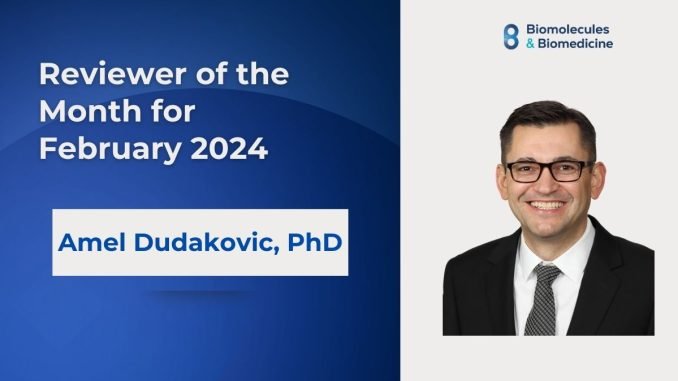The Reviewer of the Month for February 2024: Amel Dudakovic, PhD

Peer review is an essential part of the scientific publishing process, helping to ensure that research papers meet high standards of quality and accuracy. Each month, the BiomolBiomed Editorial team recognizes a reviewer who has gone above and beyond in providing thoughtful and constructive feedback on the manuscripts they’ve reviewed.
This month, we’re pleased to announce that the Reviewer of the Month Award goes to Amel Dudakovic, PhD, an Assistant Professor in the Department of Orthopedic Surgery with a focus on Biochemistry and Molecular Biology at Mayo Clinic, Rochester, MN, USA. Dr. Dudakovic’s review stood out for its exceptional quality, providing authors with valuable feedback that helped them improve the clarity and rigor of their research.
We sat down with Dr. Dudakovic to learn more about his approach to peer review and his thoughts on the current state of the publishing industry. Here are a few highlights from our conversation:
Please tell us more about your research interests and share your thoughts on recent advances or current issues that are currently shaping your field.
My research focuses on advancing the health of patients affected by musculoskeletal conditions. Specifically, I aim to identify molecular events that can be targeted to treat bone, cartilage, and fibrotic conditions. To this end, I use my background in molecular and cell biology to understand the basis of human diseases, and apply my pharmacology training to develop cell and drug-based strategies for preventing and combating these ailments. In the musculoskeletal field, current and innovative ideas are driven by recent advancements in technologies like single-cell sequencing and spatial transcriptomics. In clinical settings, the rapid integration of artificial intelligence and machine learning is anticipated to provide answers to patients with musculoskeletal ailments. My future studies will focus on leveraging these technological advancements to broaden our understanding of musculoskeletal diseases and improve treatment strategies for patients.
How has the peer-review process evolved over the years, and where do you see it going in the future? How do you ensure that you remain impartial and objective in your reviews?
The number of published articles has grown rapidly in recent years. Consequently, a larger pool of reviewers is needed for a rapid and comprehensive review of submitted manuscripts. However, it seems the reviewer pool is lagging, with the same ‘experts’ repeatedly asked to review more manuscripts. Expanding the reviewer pool is necessary, but without compromising review quality. Ideally, a more centralized system across publishers, incorporating reviewer availability, may enhance the publishing experience.
While it sounds straightforward, I ensure impartiality and objectivity by treating others’ manuscripts as I would want mine treated during the review process. My goal when reviewing manuscripts is to ensure the conclusions align with the methods and results. I also aim to provide constructive feedback and reasonable suggestions, all while maintaining a professional tone.
In today’s rapidly evolving scientific landscape, what are some of the emerging trends or best practices you have observed in the field of scientific publishing?
I am a big fan of the ‘Your Paper, Your Way’ concept when submitting manuscripts to journals, as it allows authors to focus on the science rather than on manuscript formatting. While the ‘Your Paper, Your Way’ approach is a good starting point, it would be wonderful if all journals, or at least those in the same disciplines, could agree on a uniform format to further streamline the review process.
We’re thrilled to honor Dr. Dudakovic as our Reviewer of the Month and we’re grateful for his contributions to the scientific community. We hope that his example will inspire other reviewers to strive for excellence in their work and will encourage everyone to value the peer review process as an essential part of the scientific publishing ecosystem.









